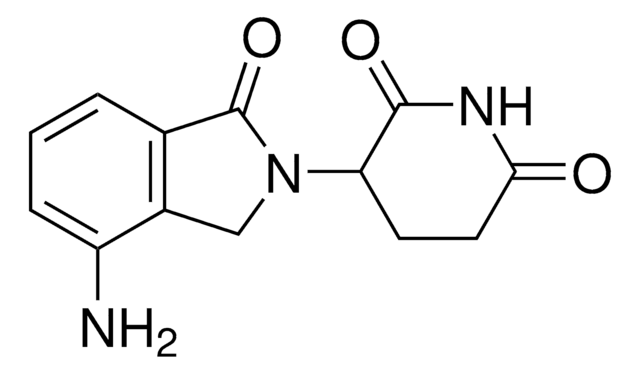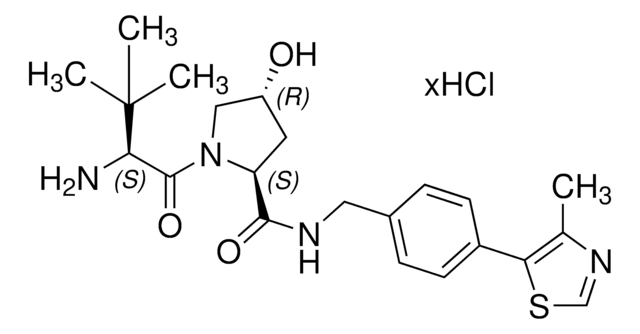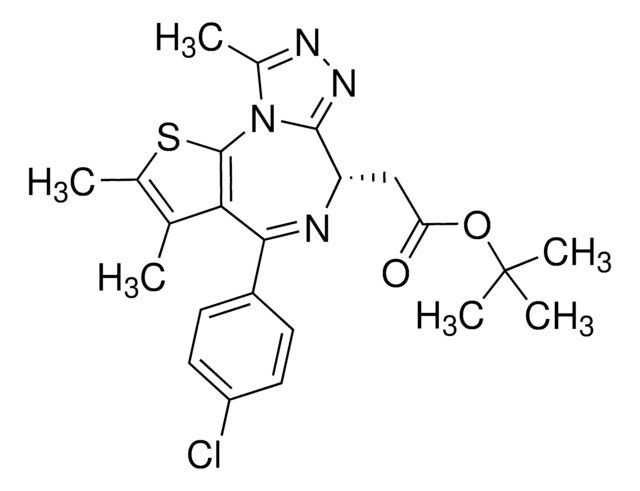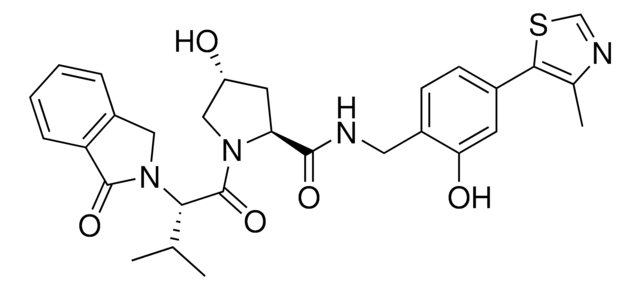SML3423
ARV-825
≥98% (HPLC)
동의어(들):
(6S)-4-(4-chlorophenyl)-N-[4-[2-[2-[2-[2-[[2-(2,6-dioxo-3-piperidinyl)-2,3-dihydro-1,3-dioxo-1H-isoindol-4-yl]amino]ethoxy]ethoxy]ethoxy]ethoxy]phenyl]-2,3,9-trimethyl-6H-Thieno[3,2-f][1,2,4]triazolo[4,3-a][1,4]diazepine-6-acetamide
로그인조직 및 계약 가격 보기
모든 사진(1)
About This Item
실험식(Hill 표기법):
C46H47ClN8O9S
CAS Number:
Molecular Weight:
923.43
MDL number:
UNSPSC 코드:
12352200
NACRES:
NA.77
추천 제품
Quality Level
분석
≥98% (HPLC)
형태
powder
색상
white to beige
solubility
DMSO: 2 mg/mL, clear
저장 온도
−20°C
SMILES string
ClC1=CC=C(C2=N[C@@H](CC(NC3=CC=C(C=C3)OCCOCCOCCOCCNC4=C(C5=CC=C4)C(N(C5=O)C6C(NC(CC6)=O)=O)=O)=O)C7=NN=C(C)N7C8=C2C(C)=C(C)S8)C=C1
생화학적/생리학적 작용
ARV-825 is a hetero-bifunctional PROteolysis TArgeting Chimera (PROTAC) containing a BRD4 binding group (OTX-015) on one end, a linker arm, and a cereblon (CRBN) ubiquitin E3 ligase binding group (Pomalidomide) on the other end, resulting in BRD4 ubiquitylation and degradation by the proteasome. In Burkitt’s lymphoma cells, ARV-825 was found to cause prolonged BRD4 downregulation, reduce c-Myc levels, block cell proliferation, and induce apoptosis with improved results compared to BRD4 inihbitors such as JQ1 and OTX015. It showed similar results.
Storage Class Code
11 - Combustible Solids
WGK
WGK 3
Flash Point (°F)
Not applicable
Flash Point (°C)
Not applicable
시험 성적서(COA)
제품의 로트/배치 번호를 입력하여 시험 성적서(COA)을 검색하십시오. 로트 및 배치 번호는 제품 라벨에 있는 ‘로트’ 또는 ‘배치’라는 용어 뒤에서 찾을 수 있습니다.
D T Saenz et al.
Leukemia, 31(9), 1951-1961 (2017-01-04)
The PROTAC (proteolysis-targeting chimera) ARV-825 recruits bromodomain and extraterminal (BET) proteins to the E3 ubiquitin ligase cereblon, leading to degradation of BET proteins, including BRD4. Although the BET-protein inhibitor (BETi) OTX015 caused accumulation of BRD4, treatment with equimolar concentrations of
Maria Pia Abruzzese et al.
Journal of hematology & oncology, 9(1), 134-134 (2016-12-03)
Anti-cancer immune responses may contribute to the control of tumors after conventional chemotherapy, and different observations have indicated that chemotherapeutic agents can induce immune responses resulting in cancer cell death and immune-stimulatory side effects. Increasing experimental and clinical evidence highlight
자사의 과학자팀은 생명 과학, 재료 과학, 화학 합성, 크로마토그래피, 분석 및 기타 많은 영역을 포함한 모든 과학 분야에 경험이 있습니다..
고객지원팀으로 연락바랍니다.








